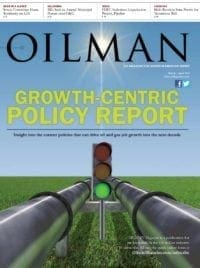On Dec. 4, 2013, at the South Texas Wildcatters Association in San Antonio, I launched the energy education campaign “It’s Time to Tell Our Story!” based upon my book “America Needs America’s Energy: Creating Together the People’s Energy Plan!” The message has been delivered through radio interviews in more than 30 states and 150 radio stations, a weekly radio show, weekly column/blog, speeches throughout the U.S., op-eds, newspaper interviews, and other media outlets.
The message is clear that the oil and gas industry needs to tell the story. The oil and gas industry must effectively tell “our story.”
Future generations are depending on us to keep the American dream alive. We are the ones who will have to do it, because our societal institutions have proven they are not up to the task. It is time to take a stand, evaluate our own impact on our nation, and play our part in preserving our country.
Though we are now facing a downturn in oil and natural gas activity, it is time to maximize our efforts in telling our important story. Demand will increase, and we need to be ready.
It is time to tell our story:
- The oil and gas industry has made and is making a tremendous impact – our energy industry for decades has provided energy security and jobs, and contributed funds for scholarships, schools, hospitals, and many other causes
- According to an IHS study, the shale play alone has created more than 2 million direct and indirect jobs
- There are approximately 10 million jobs supported by the oil and natural gas industry and approximately $225 billion in wages paid to U.S. industry employees in 2011
- Natural gas is an energy answer that is available today, and we should definitely be putting it more to use, now – for years, I have voiced my belief that natural gas reserves are critical to a strong U.S. economy and that it is extremely important for America’s energy security
- Natural gas is an abundant, clean fuel that has many domestic uses – from heating our homes to serving as an alternative to gasoline – and it is important to U.S. energy sustainability
- In 2012, the oil and gas industry paid more than $600 million in property taxes, accounting for nearly 9% of all property taxes paid that year
- By 2040, natural gas is expected to account for 35% of U.S. electricity generation, according to the U.S. Energy Information Administration (EIA)
- 70% of all oil produced in the U.S. is directed to fuels used in transportation, according to the EIA
- In 2013, the U.S. exceeded Russia in oil and natural gas production, and in
- 2011, the U.S. became a net exporter of petroleum products for the first time since 1949, according to the EIA
- There are thousands of petroleum based products provided by the oil and natural gas industry
These are only a few of the many facts and examples of the U.S. oil and gas industry.
There are men and women taking great care in making sure – 24/7 – that the consumer has the necessary energy to maintain a standard of life. From the drilling rig to pipeline to refinery to production site to oil truck to tanker – the energy industry is making a tremendous difference.
Together, the people in the oil and gas industry are making a difference! We have provided jobs, economic growth, created security, brought about a renaissance in manufacturing, caused an energy revolution, and made a global impact!
America Needs America’s Energy: It is Time to Tell Our Story! Go to peopleseenergyplan.com to join the effort or visit us on Facebook.
Mark A. Stansberry, energy advisor and corporate development strategist, has been a columnist and contributor for Energies Media since 2014. He is the author of America Needs America’s Energy: Creating Together the People’s Energy Plan and the host of the National Energy Talk podcast. Stansberry served as U.S. Senator Bartlett’s intern/staff member from 1975-76, and led Senators Bellmon and Bartlett’s State Youth Conference in 1976. Stansberry can be contacted through his website.









